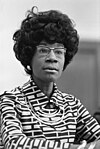Democratic Party presidential primaries, 1972
|
|
|||||||||||||||||||||||||||||||||||||||||||||||||||||||||||||||||||||||||||||||||||||||
|---|---|---|---|---|---|---|---|---|---|---|---|---|---|---|---|---|---|---|---|---|---|---|---|---|---|---|---|---|---|---|---|---|---|---|---|---|---|---|---|---|---|---|---|---|---|---|---|---|---|---|---|---|---|---|---|---|---|---|---|---|---|---|---|---|---|---|---|---|---|---|---|---|---|---|---|---|---|---|---|---|---|---|---|---|---|---|---|
|
|||||||||||||||||||||||||||||||||||||||||||||||||||||||||||||||||||||||||||||||||||||||
|
|||||||||||||||||||||||||||||||||||||||||||||||||||||||||||||||||||||||||||||||||||||||

Red denotes a state won by George McGovern. Blue denotes a state won by Hubert Humphrey Green denotes a state won by George Wallace. Brown denotes a state won by Edmund Muskie. Gold denotes a state won by Shirley Chisholm. Purple denotes a state won by Henry Jackson. Turquoise denotes a state won by Wilbur Mills.
|
|||||||||||||||||||||||||||||||||||||||||||||||||||||||||||||||||||||||||||||||||||||||
|
|||||||||||||||||||||||||||||||||||||||||||||||||||||||||||||||||||||||||||||||||||||||
The 1972 Democratic presidential primaries were the selection process by which voters of the Democratic Party chose its nominee for President of the United States in the 1972 U.S. presidential election. Senator George McGovern of South Dakota was selected as the nominee through a series of primary elections, caucuses, and state party conventions, culminating in the 1972 Democratic National Convention held from July 10 to July 13, 1972, in Miami, Florida.
As 1972 approached, President Richard Nixon faced uncertain re-election prospects. Nixon had been elected in 1968 on a platform to end American involvement in Vietnam, but his strategy of gradually handing over operational control of the conflict to the South Vietnamese military (Vietnamization) was proceeding more slowly than planned. Nixon had in fact widened the conflict by invading Cambodia in 1970, a move that ignited criticism in the press and Congress and widespread disorder on college campuses. The Paris Peace Talks had bogged down, dimming hopes for a negotiated settlement to the war. On the domestic front, a sharp recession in 1969 had shaken investor confidence, and Nixon's plan to control inflation with wage and price controls had failed to meet its objective. The administration's attempt to steer a middle course on issues of busing and affirmative action had displeased liberals and conservatives alike. Republican losses in the 1970 midterm elections further weakened the party's congressional and gubernatorial position. As a result, a large field of Democratic challengers emerged. The establishment favorite for the Democratic nomination was Ed Muskie, the moderate who acquitted himself well as the 1968 Democratic vice-presidential candidate. In August 1971 Harris polling amid a growing economic crisis, Muskie came out on top of incumbent Nixon if the election had been held that day.
...
Wikipedia







